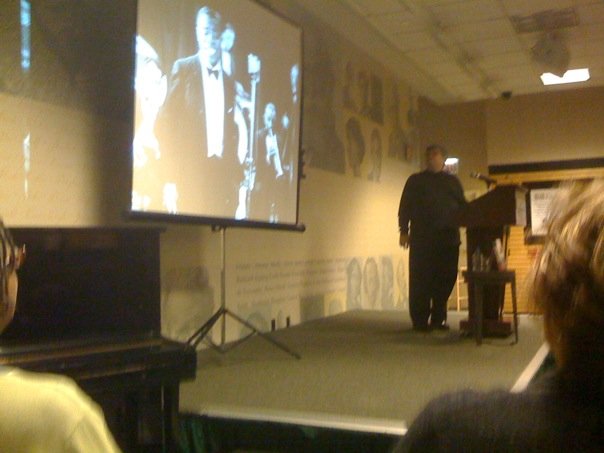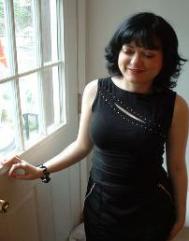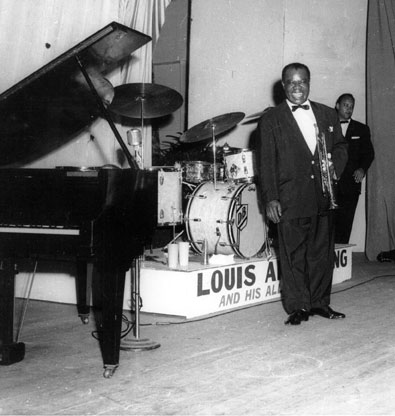Somerset Maugham responds to his critics in a 1958 CBC interview:
(This is the latest in a weekly series of arts-related videos that appear in this space each Wednesday.)
Archives for 2009
TT: With the greatest of ease (not)
I spent the night not ensconced in a comfy hotel room in Los Angeles but snoozing fitfully in an airplane seat somewhere over the middle of the country, flying the redeye to Dulles International Airport in Washington, D.C. By the time that most of you read these words, I’ll have traveled from there to Baltimore, where I plan to make three radio appearances in the afternoon, then speak about Pops: A Life of Louis Armstrong at the Enoch Pratt Free Library, the place where I did most of my research for The Skeptic a decade and more ago.
Should you find yourself in Baltimore this evening, come see me! The Pratt is at 400 Cathedral Street and my talk begins at six-thirty. For more information, go here.
Would that my travels were done, but no sooner do I wrap things up at the Pratt than I catch the next thing smoking to Philadelphia, about which more tomorrow….
TT: Almanac
“I should think it extremely improbable that anyone ever wrote anything simply for money. What makes a writer write is that he likes writing. Naturally when he has written something, he wants to get as much for it as he can, but that is a very different thing from writing for money.”
P.G. Wodehouse, Over Seventy
TT: The bicoastal biographer
 On Monday I spoke in New York about Pops: A Life of Louis Armstrong. Maud Newton, who came to hear me at Barnes & Noble Lincoln Triangle, took this snapshot as I was showing a film clip of Armstrong in action. Just before I went on stage, the folks at Houghton Mifflin Harcourt informed me that Pops has already gone into a second printing. How about that?
On Monday I spoke in New York about Pops: A Life of Louis Armstrong. Maud Newton, who came to hear me at Barnes & Noble Lincoln Triangle, took this snapshot as I was showing a film clip of Armstrong in action. Just before I went on stage, the folks at Houghton Mifflin Harcourt informed me that Pops has already gone into a second printing. How about that?
Tonight I’ll be speaking at the Los Angeles Public Library about Pops. The fun starts at seven o’clock sharp. For more information, go here.
In other Pops-related news:
• The current issue of The New Yorker contains a four-page review-essay about Pops by John McWhorter. Here’s the money quote: “Teachout excels at conveying the interplay between Armstrong the artist and Armstrong the entertainer.” The piece is only available to New Yorker subscribers on line, but you can download a podcast by McWhorter that includes soundbites from Armstrong’s private tapes–the very same ones I used in writing Pops–by going here.
• John Schaefer’s interview with me on WNYC’s Soundcheck is now available in streaming audio or as a podcast. To listen, go here.
• This touched me.
TT: For friends with big stockings
• The Bing Crosby CBS Radio Recordings (1954-56), a seven-CD box set from Mosaic, consists of 160 songs originally transcribed by Crosby for broadcast on his radio shows of the Fifties, all of them accompanied not by a studio orchestra but by an exceedingly spiffy four-piece jazz combo led by Buddy Cole, one of the top studio pianists of the day.
 Nowadays few people remember that in addition to being a consummate balladeer, Crosby was also one of the smoothest and most elegant jazz singers who ever lived. ”Bing had the best time, the absolute best time,” said the great jazz drummer Jake Hanna, who played with Crosby late in his life. “And I played with Count Basie, and that’s great time.” This set leaves no possible doubt of his urbane, unflappable swing. The superb liner notes are by Gary Giddins, whose two-volume biography of Crosby (the second installment of which will be published in 2012) promises to be definitive.
Nowadays few people remember that in addition to being a consummate balladeer, Crosby was also one of the smoothest and most elegant jazz singers who ever lived. ”Bing had the best time, the absolute best time,” said the great jazz drummer Jake Hanna, who played with Crosby late in his life. “And I played with Count Basie, and that’s great time.” This set leaves no possible doubt of his urbane, unflappable swing. The superb liner notes are by Gary Giddins, whose two-volume biography of Crosby (the second installment of which will be published in 2012) promises to be definitive.
• The Golden Age of Television, a three-DVD Criterion Collection box set, contains eight live TV dramas telecast between 1953 and 1958, including the original versions of Paddy Chayefsky’s “Marty,” J.P. Miller’s “The Days of Wine and Roses,” Arnold Schulman’s “Bang the Drum Slowly,” and Rod Serling’s “The Comedian,” “Patterns” and “Requiem for a Heavyweight.” All eight plays were rebroadcast on PBS in 1981 and later issued on videocassette, but this is the first time that any of them has been officially released on DVD. Would that the Criterion Collection had gone the extra mile and thrown in one of Horton Foote’s teleplays–I would have loved to see what “The Trip to Bountiful” looked like on TV–but even as is, The Golden Age of Television is a time capsule full to the brim of the best that live TV had to offer in its halcyon days.
TT: Almanac
“It is a great advantage to a president, and a major source of safety to the country, for him to know that he is not a great man.”
Calvin Coolidge, The Autobiography of Calvin Coolidge
TT: Elsewhere
 • I’m busier than I like to be, but I still made time to read Maud Newton‘s Los Angeles Times essay about the difference between an autobiographical novel (which she’s writing) and a memoir (which she’s not).
• I’m busier than I like to be, but I still made time to read Maud Newton‘s Los Angeles Times essay about the difference between an autobiographical novel (which she’s writing) and a memoir (which she’s not).
In her words:
At 19, at the University of Florida, I took a fiction class from the formidable Harry Crews. When Crews handed back an inchoate story I’d lamely based on my father, I could feel his scorn radiating off the paper. “The creation of a monster is not the creation of fiction,” he’d written, in all caps.
Crews taught me that an event doesn’t make for a resonant story merely because it’s weird and bad and actually happened; he helped me to see that the books I love most–such as Graham Greene’s “The End of the Affair”–are powerful and moving because the author breathed life into them with words and hard work and imagination.
Since then I’ve written–in a more nuanced way, I hope–autobiographical essays about my family. But the “novel” I imagined writing as a child has transformed, through thousands of hours and countless drafts, into actual fiction….
This is a book I long to read. Until then, Maud’s essay is here.
• Anyone who writes book reviews–or any other kind of criticism–should take this piece to heart.
• Clive Davis wrote a smart piece about Broadway musicals for the London Times in which I figure prominently (which isn’t what made it smart, needless to say). Here’s an excerpt:
[D]o we place too much of a burden on musicals when we expect them to reach the heights of, say, the 1930s or 1940s? After all, as the impresario Cameron Mackintosh pointed out to me, one reason the great shows of yesteryear created such an impact is that they grew out of a popular culture in which the art of writing show tunes played a central role. Moreover, it was an age when theatre songsmiths and producers did not have to compete with the computer games industry or the juggernaut that is rock music….
Read the whole thing here.
• Schadenfreude is definitely not nice and may actually be sinful. That said, I couldn’t help but titter when I read Scott McLemee’s brutal Inside Higher Ed takedown of Cornel West, in which he quoted this passage from West’s latest book, a memoir that shall remain nameless and linkless:
The basic problem with my love relationships with women is that my standards are so high–and they apply equally to both of us. I seek full-blast mutual intensity, fully fledged mutual acceptance, full-blown mutual flourishing, and fully felt peace and joy with each other. This requires a level of physical attraction, personal adoration, and moral admiration that is hard to find. And it shares a depth of trust and openness for a genuine soul-sharing with a mutual respect for a calling to each other and to others. Does such a woman exist for me? Only God knows and I eagerly await this divine unfolding. Like Heathcliff and Catherine’s relationship in Emily Bronte’s remarkable novel Wuthering Heights or Franz Schubert’s tempestuous piano Sonata No. 21 in B flat (D.960) I will not let life or death stand in the way of this sublime and funky love that I crave!
I can’t top the reaction of McLemee’s wife: “Any woman who reads this needs to run in the opposite direction when she sees him coming.”
TT: Yes, Virginia, still more about Pops
I expect that some of you have heard more than enough about Pops: A Life of Louis Armstrong. Alas, the good news keeps flooding in, so I’ll keep it as short as possible today and restrict myself to posting the latest links:
• John Schaefer will interview me about Pops on WNYC’s Soundcheck today at two p.m. ET. Listen live in the New York area by tuning to 93.9 FM, or go here to listen on your computer via streaming audio.
• New Yorkers, take further note: I’ll be reading from and signing copies of Pops tonight at the Lincoln Triangle Barnes & Noble, located at Broadway and Sixty-Sixth Street. The show starts at 7:30. Go here for more information.
 • On Tuesday I fly to Los Angeles, where I’ll be speaking about Pops at the Los Angeles Public Library’s Central Library, located at 630 W. Fifth Street. The show starts at seven p.m. Go here for more information.
• On Tuesday I fly to Los Angeles, where I’ll be speaking about Pops at the Los Angeles Public Library’s Central Library, located at 630 W. Fifth Street. The show starts at seven p.m. Go here for more information.
• To read David Margolick’s New York Times Book Review piece about Pops, go here.
• To read the Seattle Times‘ review of Pops, go here.
• The Atlantic‘s review of Pops is now out. To read it, go here.
• Pops made the Chicago Tribune‘s list of the best nonfiction of 2009. To see the full list, go here.
• Ed Champion interviewed me about Pops for the latest episode of The Bat Segundo Show. To listen in streaming audio or download the program as a podcast, go here. (This is, if I do say so myself, an unusually interesting interview.)
• To read the final installment of Marc Myers’ five-part interview with me, go here.
* * *
For those who long to hear about something–anything–else, you’ll find plenty of brand-new non-Pops stuff in the right-hand column and immediately above this posting, with more regular blogging continuing tomorrow.
